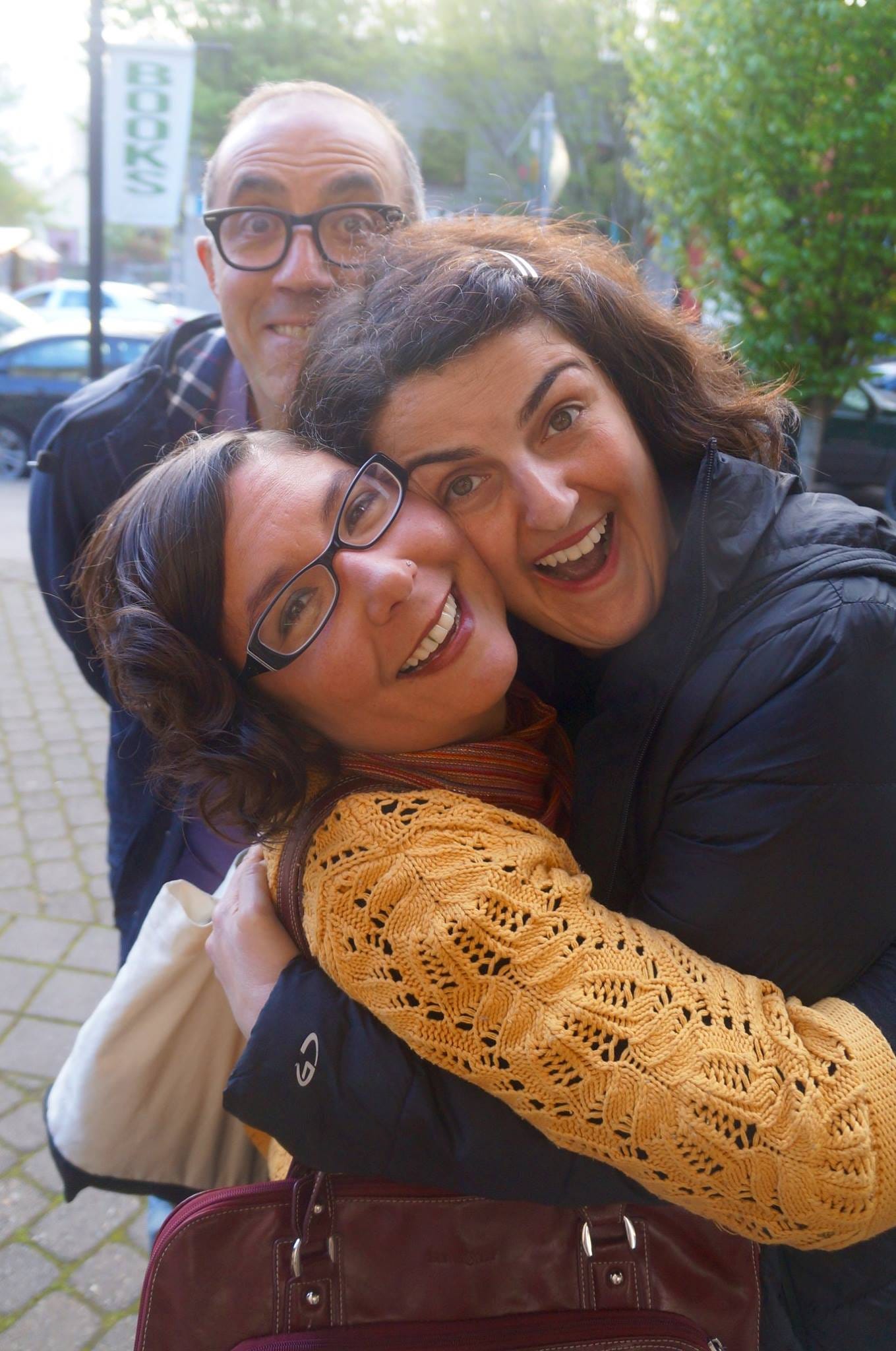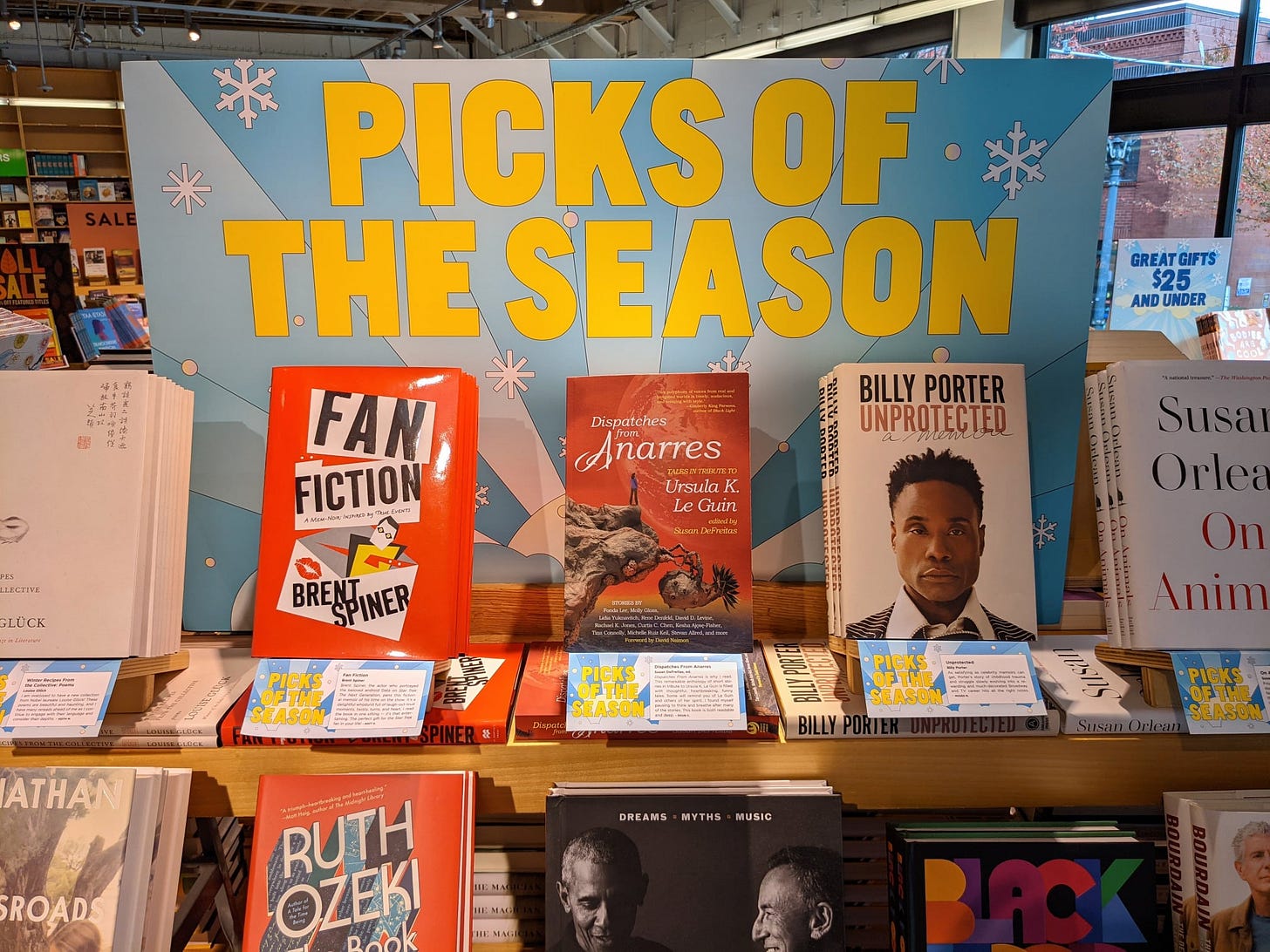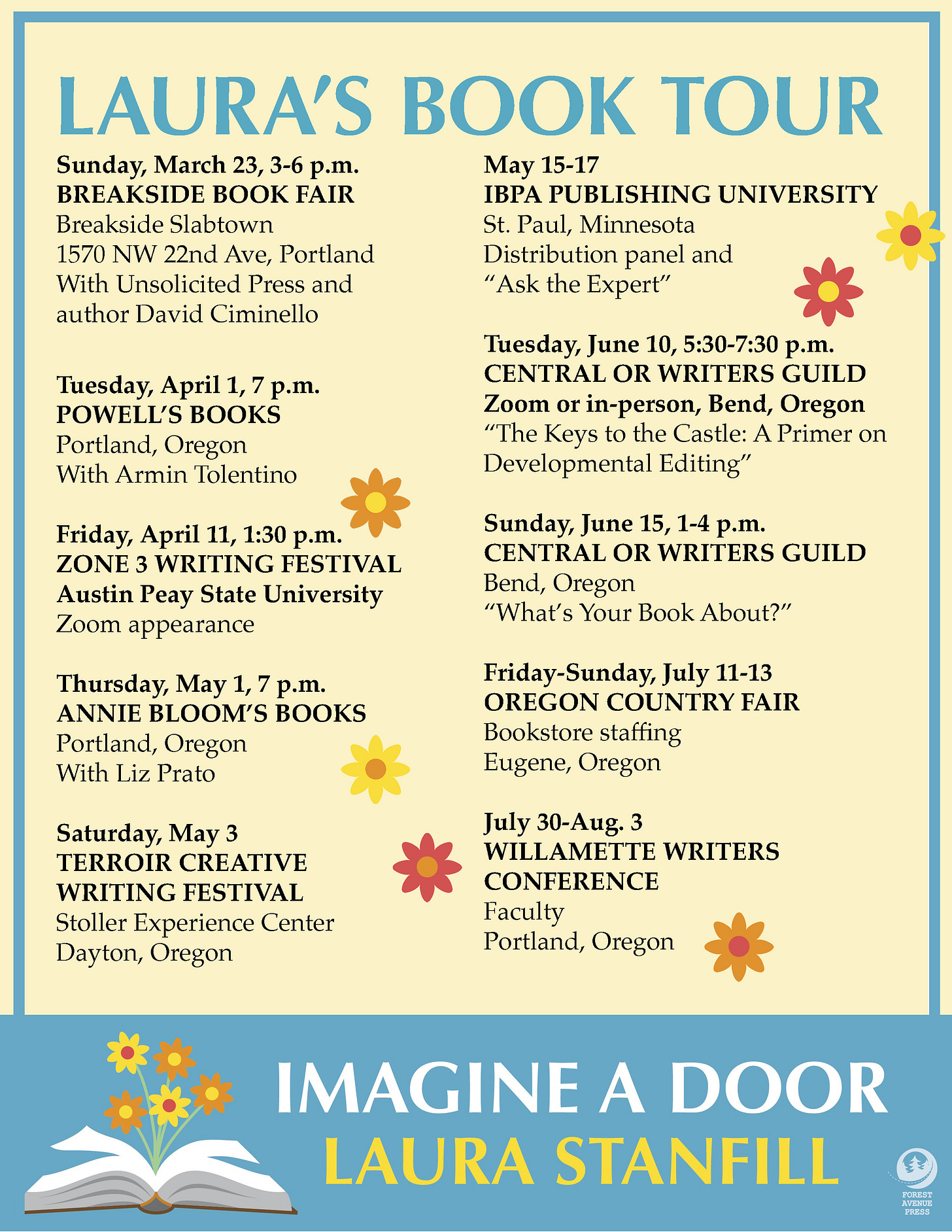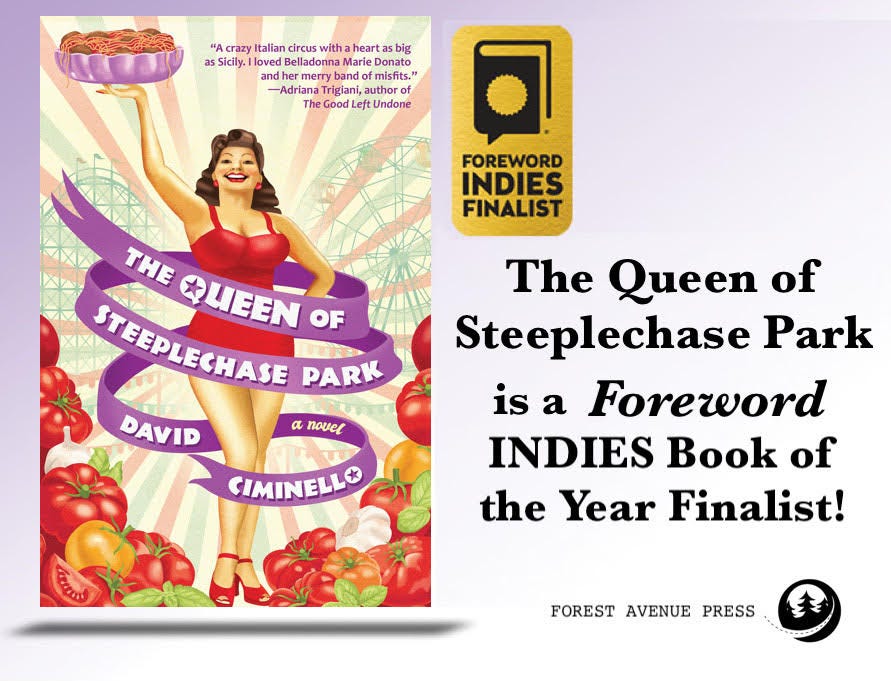I’m so sad to report the loss of Susan DeFreitas of Santa Fe, May 19, 1977 – February 26, 2025.
Susan was a brilliant editor and book coach and the editor of Dispatches from Anarres: Tales in Tribute to Ursula K. Le Guin, a Forest Avenue anthology that came out in 2021. She was a huge force in the Portland literary community during the years she lived here and her influence has continued.

I asked a few friends and colleagues to share remarks about her for this newsletter, not just for us, her community, but for her family and friends outside the lit space. So they know what she meant to us. What she still means.
Here’s Mo Daviau, author of Every Anxious Wave (St. Martin’s) and the forthcoming Epic and Lovely (West Virginia University Press):
I met Susan exactly ten years ago when I was invited to join The Guttery, a local writing critique group. The Guttery was fantastic: smart, talented writers who really cared about giving strong feedback. But Sooz, as I liked to call her, was on a whole other level. She was a profoundly gifted editor. She saw things in your work that others didn’t. She had a natural and unpretentious understanding of what worked and what didn’t in fiction. Anyone who knew her would say she was smart, but her smart was otherworldly. I hired her to do developmental edits on my forthcoming novel. (I selfishly hate that she didn’t live long enough to read the final draft.)
We became good friends over the years. We called each other Friendo, as a term of affection but also because we both thought it was kind of funny and weird that “Friendo” could also be a term of derision. She got words on the same bizarro level as me. I’ve never known anyone else like her. I miss her so much.
Here's Ali Shaw, founder of Indigo: Editing, Design, and More, and co-owner of Bold Coffee & Books in Portland, Oregon:
The first time I met Susan, I was a face in the crowd, and she was a performer at the mic.
We were at the Pacific University low-residency MFA biannual retreat. I’d presented earlier that day. I don’t even remember the topic now.
That night, in the bar, Susan’s name was called on the open mic roster, and I was elbow to elbow with so many aspiring authors—an editor’s dream. She took the mic with poise—it was clear she was accustomed to performing, confident about her work, passionate.
I remember the theme of her piece was environmentalism. The refrain: “The truth, Daniel…” Her pauses well-timed. Her voice crescendoing at the poem’s climax. The denouement reverberating through the bar.
I don’t remember if applause thundered or if people were wrapped up in their own conversations, as people often are in bars. I do remember that I was impressed. In contrast to the typical open mic performances with twentysomethings—topics hovering around new sexual experiences, rants about exes, and other vulnerable experiences yet limited perspectives—here was a fully developed poem with personal passion, global concerns, love (her boyfriend, Daniel, I met later), and inspiration. Her delivery made my skin tingle, it was that powerful.
After the rest of the performers had their turns at the mic, I made my way across the room to compliment Susan on her work. She, Daniel, and I talked for another couple of hours about what makes a story, a poem, a novel work. What an author must bring to the page to succeed in capturing a reader’s full attention.
“Have you ever thought about being an editor?” This question surprised me as it came out of my mouth. I’d accepted the invitation to speak to the program to help future authors with the pragmatic steps of publishing. I’d hoped, a little, some of them might turn into clients. I had not planned at all to recruit another editor.
Susan smiled. She was about to graduate, she told me. And working with story for a living—while she continued her own writing, of course—sounded great.
And so began Susan’s time at Indigo. Nearly a decade later, in our final Indigo meeting, as she was leaving to focus fully on her own book coaching business, she said to me, “You taught me a trade, and I’m grateful for that.” I’d never thought of it that way, but I suppose she was right. She had the story analytics down—I taught her the client mechanics.
Now, as I read others’ tributes to her, I see that my first interaction with Susan is not unique. The common threads: She was talented and she knew it. She shared her expertise, helping people grow, if they were truly ready. Her self-assurance was either magnetic or intimidating, or maybe both.
Susan knew the potion for a good story in a way I’d never seen before or since. I wish her own story had more of a crescendoing climax. Her denouement surely reverberates, though.
In my mind, she’ll always be on that stage—passionate, poetic, and very much alive.
I’ll close this tribute with a statement from Ariel Gore, who teaches writing online at Ariel Gore’s School for Wayward Writers at the Literary Kitchen. Her new book, Rehearsals for Dying, is now out from Feminist Press:
When Susan moved to Santa Fe we just knew each other by reputation and on social media, but she reached out and we started getting together on Wednesday nights when my son had chess club at the downtown library. We’d meet at the Lowrider bar and talk about writing and teaching.
She was just putting together Dispatches from Anarres and really wanted to talk about being a literary citizen—what it meant not just to be a writer but to serve the literary community.
The same went for teaching. She wanted to lead workshops, but she knew about the racist, imperialist history of the writing workshop, so she created Workshops Against Empire.
During the pandemic, she started teaching World Building in the Literary Kitchen--my school for wayward writers—and also doing skill shares at our annual camp down in Truth or Consequences, New Mexico.
At the same time, of course she was always working on her own writing—the collection that she was working on with me in a yearlong program I was teaching in the Literary Kitchen in 2023 was this magical interconnected short story collection that took place largely in the American West around the areas that she was most familiar with—Prescott, Arizona, Portland, Oregon, and Santa Fe, New Mexico—but also where she grew up in Michigan, and in all of these stories there was a real time storyline and a dreamtime storyline. I don’t know whether or not she was a Murakami fan, but the stories had that quality that the best Murakami stories have in which we begin to understand the writer/artist as a kind of magician who is able to move between the conscious realm and the dream realm and in doing so go deeper into themselves, but also show the reader something about themselves—and change the world. When I bring those stories to mind now, what stands out to me is how much realer the dreamtime so often felt than the “real” time, and that seems poignant now that we know her cancer had come back and was overtaking her body through that year—and poignant now that she’s not with us in real time anymore. Now I’ll be watching for Susan in dreamtime, and in the underworlds of my own stories, and in magical time. I hope everyone else will be, too.
I’ll close with a note Susan sent our Dispatches from Anarres contributors on April 4, 2022, after we had our first in-person party to celebrate the anthology. Most of our launch events were online, because of COVID, so it felt extra special to meet outdoors and celebrate each other.
It's been a whirlwind since I returned from PDX, but I just wanted to drop a line to say thank you to all of you who came out for our "cast party" for DISPATCHES!
Really, I can't tell you how meaningful it was to connect with each of you in person, and to celebrate this great thing we've made together. =)
I love that new readers continue to find this anthology and rave about it online, I loved seeing it featured so prominently at Powell's, and I hope we'll continue to nurture these literary connections between ourselves, from near and afar.
Susan helped a lot of us get our words into the world, to be meaningful with our art and our social justice work. I know she was proud of how many copies of Dispatches have been selling and I am honored to be part of her legacy. I hope we, together, continue to nurture our literary connections just as Susan bid us.
If you knew Susan DeFreitas, and especially if she was your book coach or editor, please consider leaving a comment here. I want to hold space for our community to send our collective appreciation up. I also encourage others, especially her editing clients, to share reflections in their newsletters. To honor the magic she brought to the page.
ABOUT MY NEW BOOK…
Imagine a Door, my book for writers, comes out Tuesday, April 1. I’ll be at Powell’s at 7 p.m. in conversation with poet Armin Tolentino.
On Thursday, May 1, also at 7 p.m., I’ll be at Annie Bloom’s with Liz Prato to talk about Imagine a Door.
I started working on this manuscript in 2016 and it’s full of my publishing stories and interviews with more than 75 experts and authors. I loved sharing it with readers at the first Gorge Book Festival, sponsored by Columbia Center for the Arts and Waucoma Bookstore, last weekend. So far readers are really responding to the book, which makes me so happy. If you want a review copy or to set up an interview with me, reach out!
Substacker Dot Hearn recently shared this lovely shout-out about Imagine a Door and books by Lidia Yuknavitch, Ariel Gore, and Jenny Forrester. Thanks, Dot!
Imagine a Door clocks in at 522 pages. I revised for years, but I kept adding material, wanting it to help everyone. You might learn a lot from it. You might also use it to press tofu. A writer can hope for both, right?!
IN OTHER NEWS…
Scott Nadelson, author of Trust Me, won the 2024 Edward Lewis Wallant Award, a prestigious Jewish literary prize.
The Forest Ave submissions committee, headed by Liz Prato, has been busy with our most competitive submissions period yet! Thanks to all who let us spend time with your work. If you haven’t heard a response yet, consider yourself a finalist! We’re working on the first few acquisitions and making some really hard decisions.
Daniel A. Olivas, author of Chicano Frankenstein, is at the Tucson Book Festival this weekend. Stop by and listen to his panels if you’re there.
The Publishing Post featured Forest Ave in its Indie Spotlight. I’m excited to learn more about the Post!
David Ciminello, author of the debut novel The Queen of Steeplechase Park, is a finalist in the Foreword INDIES for historical fiction!
Daniel A. Olivas’s Chicano Frankenstein is also a finalist! And it was recently reviewed in Runestone Journal.
Thanks for reading! And please leave your thoughts about Susan in the comments.









Thank you for sharing this, Laura. I didn't know Susan, but I see all these tributes to her, and now yours and those whose words you have included. I'm sorry I didn't have the pleasure to meet her and learn from her. And yes! your book. April 1: A reason to celebrate.
Thank you for telling us more about Susan. I cannot remember if she and I ever crossed paths in person, but I admired her work. Hot Season was a helluva novel; Dispatches From Anarres one of those “damn, wish I’d thought of that” strokes of genius, and brilliantly executed to boot. Of course I went to the DFA panel at the next Portland Book Festival and of course it was delightful. My condolences to all who loved her.